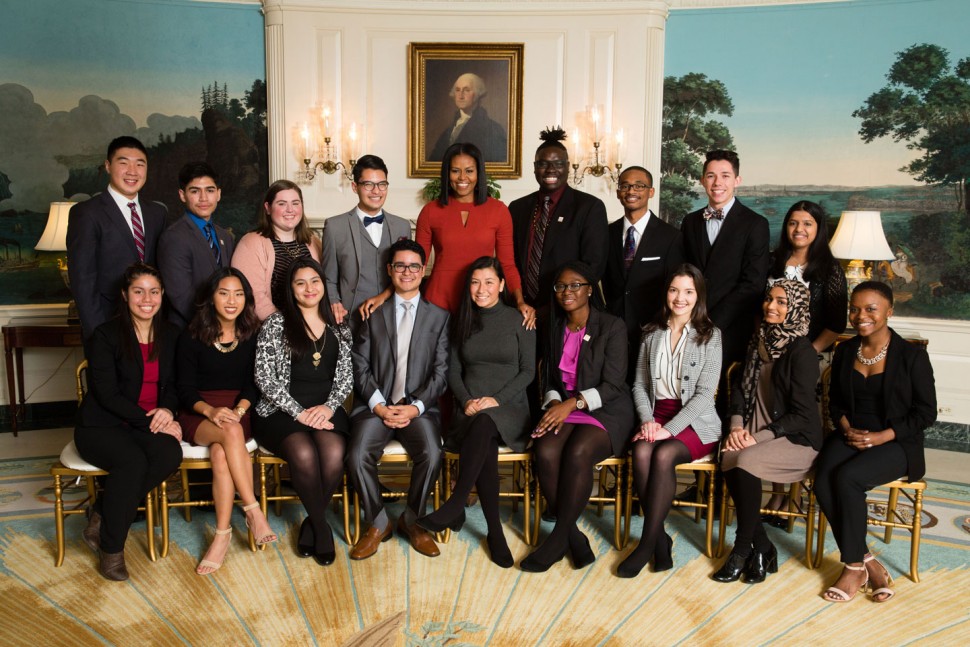Sorting through the college application process — from checking out schools to meeting various application deadlines and everything in between — can be especially daunting for students from low-income backgrounds.
The first in his family to go to college, Northwestern University freshman David Guirgis knows the difficulties firsthand. That’s why he jumped at the invitation to be one of 17 members of the inaugural Better Make Room student advisory board, a program within Michelle Obama’s Reach Higher initiative, which seeks to empower young people to complete education beyond high school.
Better Make Room’s Up Next campaign is a text-messaging service that reminds high school upperclassmen about upcoming college application deadlines and connects them with college-entrance advisors and scholarship opportunities. The early returns look promising: A recent pilot study saw a six-percent bump in enrollment by low-income students when they received reminder text messages.
It’s now up to Guirgis and the rest of the student board, a nationwide team of high school seniors and college underclassmen from low-income households, to come up with new innovative ideas in the same vein as Up Next.
“I faced a number of challenges when applying to college,” Guirgis said. “This gives me an opportunity to expand my efforts in something I’m really passionate about. It gives me unprecedented ability to project my ideas on how to make college more accessible.”
Guirgis is among network of exceptional low-income students who have gained entrance to premier universities across the country with the help of QuestBridge, a program that offers support beginning in high school and continuing through college and first jobs.
One of the biggest thrills of the Jersey City, New Jersey native’s Better Make Room orientation was his whirlwind trip to the White House in early January for a brief encounter with the former First Lady.
“I’ve always admired her and was just over the moon about it,” Guirgis said. “I can’t say enough good things about her.
“I’ve never been a part of anything quite like this,” he added. “We’ll essentially be helping to develop this campaign down the road, with a lot of liberty to create programs however we want.”
Learn more about Guirgis’ trip to the White House and his next steps in the following Q&A.
Q&A
How did you react upon learning you had been accepted to the Better Make Room board?
I read the email and kind of flipped out and lost it after that. It’s something I never thought would happen in my life. Nobody ever does. Getting that email, realizing it’s a real thing in which I’ll work under the [former] First Lady, was super intense.
What was it like to meet Michelle Obama?
We took a photo with her and met her in person — that was a surreal experience. She hugged all of us and was so incredibly gracious. She expressed how happy she was to have us working for Better Make Room. I don’t know how to fully describe it.
Were you nervous?
Oh, God, yes. I was terrified.
How did being a QuestBridge scholar shape your view on college accessibility?
I had to research programs like QuestBridge on my own. By getting it I was lucky enough to have really good student counselors to navigate the financial aid process, apply for waivers, etc. I was in a remarkable position because I had a lot of information to work with. I know a lot of students aren’t aware of such programs.
So, the bottom line is …?
If we’re going to make college more accessible to low-income students, it’s important to make scholarships, programs and prep resources for four-year colleges easily accessible. It’s a matter of making these students as competitive as those who are more privileged.
What’s your role with Better Make Room moving forward?
I will work to identify accessibility issues at Northwestern or a nearby high school community, such as Chicago Public Schools (CPS). We’re in the super early stages of this initiative, but I’d like to focus on CPS and create resources along the lines of “college signing day” to encourage CPS students to apply to four-year colleges.


